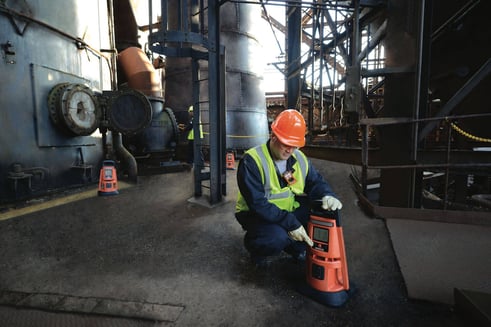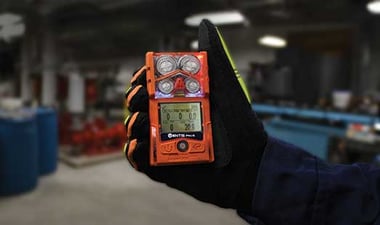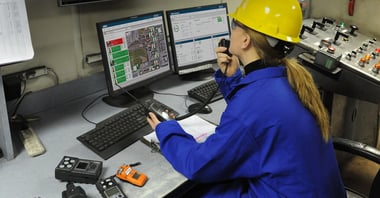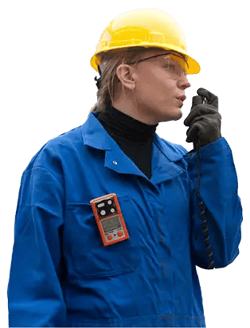The importance of monitoring hazardous gases during high-risk projects cannot be understated. Having the right fleet of equipment and solutions that provide you with insight into your data can help you better protect your people, plant, community, and environment. Let’s look at an example of how a perimeter monitoring (also known as fence-line monitoring) strategy with connected gas monitoring equipment could prevent incidents in the workplace.
Setting Up Perimeter Monitoring at Industrial Facilities
Picture this: a crew begins a new infrastructure project to install new underground lines. The workers will need to dig a trench near pressurized lines that they know contain toxic gases. To reduce the risk of these hazards, and to create a detection barrier, the team sets up a fleet of Radius BZ1 Area Monitors and RGX communication gateways around the perimeter of the project.
The Radius BZ1 can be deployed in seconds and left in the field for up to 7 days on a single charge, making it possible for the workers to quickly start the job without worrying about swapping batteries or calling IT to connect the monitors to their wireless network.
With a network of area monitors across the site, the workers in the field can be confident that any gas hazards will be detected and communicated no matter where they are. At the same time, safety personnel can view the real-time gas readings from their laptop or phone to get a complete picture of the status of the work area.
Perimeter Monitoring in Action
During the workday, someone unknowingly grazes a pressurized line. Toxic gas begins to leak onto the worksite. Later that night, the gas reaches nearly deadly levels.
The Radius BZ1 placed inside of the trench immediately detects the gas and simultaneously send out an alert to all other Radius BZ1 units and RGX communication gateways. The night crew onsite immediately begins evacuation on the cue of the high-decibel alarms and clear action messages on display.
When the emergency response center receives the alerts and real-time gas readings with iNet Now Live Monitoring, they take swift action to shut down the lines to stop the leak.
The company’s incident command is activated and uses SAFER One to anticipate direction of gas plume. This allows the crew to act swiftly without guesswork. With the insights from SAFER One, the team can pinpoint the source of the leak to reduce its impact and map danger zones—information that’s critical when they advise the executive team on how to respond and evacuate both the community and the employees who remain onsite.
Because the team used specialized software solutions in addition to their area monitors, the data that they gather will be summarized and reportable for response and follow-up after the incident. The company will know who was exposed and where so that they can follow necessary procedure after they are sure that everyone is out of harm’s way.

Creating a Safety Strategy
With a 24/7 perimeter monitoring strategy, the team was notified of the leak without putting anyone in danger. The real-time data allowed them to take immediate action to stop the leak and protect their surrounding community, employees, and environment. The Radius BZ1 readings from across the site combined with plume forecasting through SAFER One provided incident command the details they needed to react swiftly and confidently.
Continuously monitoring for harmful gases at the perimeter of your site is critical for everyone’s safety. In this example, the crew was aware of the risks of their project and created a strategy that would work to keep them safe and get them back on the job quickly. By setting up a plan and automating the processes, the team minimized injury and downtime and kept operations running as smoothly and safely as possible.
When you’re short on tools during your next project, renting is the most efficient way to quickly obtain gas detection equipment in an explosion or other emergency. Renting also goes beyond emergencies, so whether your focus is based on turnarounds, outages, special projects, natural disasters, or repair replacements, you can depend on our rentals for your short-term gas detection needs.
For additional information on our rental program, or to get a rental quote today, visit our website.



